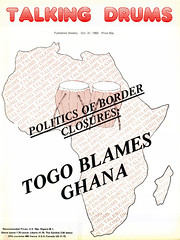Comment - Lines On The Map
It is quite easy to get indignant about the high-handed manner of the colonialists but at the level where those lines on the map become reality, it ceases to be a philosophical or ideological question, and becomes a very real human problem.
There are those who since that meeting a hundred year, ago have had to cook in one country and go to bed in another country.
The people who were divided in so cavalier a fashion have never adjusted properly to the borders that were imposed on them no matter the number of changes in governments that rule them.
It is difficult enough for such people to comprehend the differing loyalties expected of them once having moved from kitchen to bedroom, but their situation becomes completely untenable when the governments of the two countries they find themselves in, also happen not to have cordial relations.
One of the fundamental questions that faced Africa on the attainment of independence was the problem of the borders that had been imposed on the African peoples by colonialists. The founding fathers of the Organisation of African unity decided that trying to deal with the border problems would be like touching a hornets nest, they therefore came up with the theory of the inviolability of pre-independence borders. In other words they opted for the easy way out and decided that it was much easier to continue blaming the colonialists forever and ever than to attempt a solution to a very real human problem.
Anybody who has ever had the misfortune of attempting to travel the four hundred or so miles between Accra and Lagos would have experienced at first hand the absurdity of the borders, when such a journey means tackling six different sets of border posts. The problem was highlighted acutely and brought to world attention during the Nigerian expulsion of aliens earlier in the year. The large scale human suffering that occurred would have been avoided but for these borders.
The Ghana-Togo border is as typical an example of the problem if ever there was one. Divided families who have never accepted that they belong in two different countries. Much of the smuggling that goes on along these borders continues in spite of appeals to patriotism and stringent penalties not because the people are any more criminally inclined than others, they simply refuse to accept that there could be anything wrong with the fruits of their kitchen garden in their front yard.
The problems are even more aggravated when the economic and political situations in the two countries become different. It is natural for people to gravitate towards areas that are economically more prosperous, politically more stable, and socially more appealing. All these states of affairs have existed in either Ghana or Togo at one time or the other.
The Ghana government's various postures on the current border problems with Togo illustrate the dilemma that faces all governments in Africa.
The cocoa smuggling charges are very real and have contributed to Ghana's economic woes, but surely there must be a solution other than closure.
A more contentious problem is one of security and claims and counterclaims of destabilization. Ghana has accused Togo of harbouring Ghanaian citizens who want to overthrow the PNDC. At one time in the history of both countries, it was the Togolese government that was accusing Ghana of harbouring Togolese dissidents.
It is very tempting to suggest that two neighbouring countries should not harbour dissidents of each other's country, but knowing the behaviour of the governments, the sufferers again will be the ordinary people. What would happen to people running away from persecution, from starvation and natural disaster, where would people run to if their lives were threatened by oppressive regimes in their own countries?
The human suffering that is caused by the continuous closure of the borders between Ghana and her neighbours far outweighs any advantages that the regime can draw from sealing her citizens inside.
It is still possible to blame it all on the colonialists of course, but by the year 2084, when the second centenary of the Berlin Conference comes around, that excuse would have worn very thin.
Send In The Marines
There are many ironies in the American led invasion of Grenada. To think that this invasion which Maurice Bishop had predicted and dreaded for so long should take place after he had been killed and more, that it is the killing of Mr Bishop and some of his Ministers that Mr Reagan has cited as one of the three reasons for the intervention.From the African or more specifically the West African perspective, it is all very baffling and the hypocrisy a bit thick.
The region is rather used to governments being violently overthrown, the leaders being brutally executed and a lot of leftist rhetoric filling the airwaves.
The marines don't get sent in and on the contrary, after a decent interval, the brutal leftist thugs are transformed into respectable statesmen, received and are feted at the White House and praised for positive human rights improvements in their countries.
The leftist rhetoric dims, the Cuban advisers leave and even the Libyans are not heard of too frequently....
It's a wonder that President Reagan did not think of the West African formula for Grenada. It has worked admirably there.
